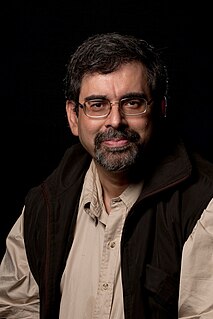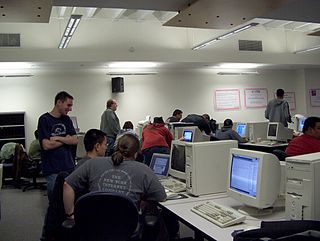
The Apache HTTP Server is a free and open-source cross-platform web server software, released under the terms of Apache License 2.0. Apache is developed and maintained by an open community of developers under the auspices of the Apache Software Foundation.

Eric Steven Raymond, often referred to as ESR, is an American software developer, open-source software advocate, and author of the 1997 essay and 1999 book The Cathedral and the Bazaar. He wrote a guidebook for the Roguelike game NetHack. In the 1990s, he edited and updated the Jargon File, published as The New Hacker's Dictionary.

Irssi is an IRC client program for Linux, FreeBSD, macOS and Microsoft Windows. It was originally written by Timo Sirainen, and released under the terms of the GNU GPL-2.0-or-later in January 1999.

Revolution OS is a 2001 documentary film that traces the twenty-year history of GNU, Linux, open source, and the free software movement.
O'Reilly Media is an American learning company established by Tim O'Reilly that publishes books, produces tech conferences, and provides an online learning platform. Its distinctive brand features a woodcut of an animal on many of its book covers.

Spencer Kimball is an American computer programmer, entrepreneur, and business executive. He is the CEO of Cockroach Labs, a company he co-founded in 2014. His work as a programmer includes creating GNU Image Manipulation Program (GIMP) while still in college, and assisting the source code development of CockroachDB, the namesake software of Cockroach Labs. In addition to Cockroach Labs, Kimball was involved in the founding of other tech startups including WeGo and Viewfinder.

Vipul Ved Prakash is a software engineer and Internet entrepreneur. He is the co-founder of anti-spam company Cloudmark and social-media search company Topsy.

LinuxTag is a free software exposition with an emphasis on Linux, held annually in Germany. LinuxTag claims to be Europe's largest exhibition for "open source software" and aims to provide a comprehensive overview of the Linux and free software market, and to promote contacts between users and developers. LinuxTag is one of the world's most important events of this kind.

Free and Open source Software Developers' European Meeting (FOSDEM) is a non-commercial, volunteer-organized European event centered on free and open-source software development. It is aimed at developers and anyone interested in the free and open-source software movement. It aims to enable developers to meet and to promote the awareness and use of free and open-source software.

Atul Chitnis was an Indo-German consulting technologist. He was one of the organizers of FOSS.IN, which was one of Asia's free and open source software (FOSS) conferences.

PCQuest is an Indian technology publication, and part of the Cyber Media group of publications that also publish Dataquest.

LAMP is an acronym denoting one of the most common software stacks for many of the web's most popular applications. However, LAMP now refers to a generic software stack model and its components are largely interchangeable.
Crack is a Unix password cracking program designed to allow system administrators to locate users who may have weak passwords vulnerable to a dictionary attack. Crack was the first standalone password cracker for Unix systems and the first to introduce programmable dictionary generation as well.

Linux is a family of open-source Unix-like operating systems based on the Linux kernel, an operating system kernel first released on September 17, 1991, by Linus Torvalds. Linux is typically packaged in a Linux distribution.

TopologiLinux is a free Linux distribution to be run on an existing Microsoft Windows system. The main feature of TopologiLinux is that it does not require any partitioning. It is based on Slackware and Cooperative Linux (coLinux). TopologiLinux has been chosen as one of nine open-source projects used as principal examples in a study of the characteristics of open-source software.
Hiawatha is a web server available for multiple platforms. It has been developed by Hugo Leisink since 2002.
Nikolai Bezroukov is a Senior Internet Security Analyst at BASF Corporation and was member of Computer Science at Fairleigh Dickinson University. Also Webmaster of Open Source Software University, a volunteer technical site for the United Nations Sustainable Development Networking Programme (SDNP) that helps with Internet connectivity and distributes Linux to developing countries.

A Linux User Group or Linux Users' Group (LUG) or GNU/Linux User Group (GLUG) is a private, generally non-profit or not-for-profit organization that provides support and/or education for Linux users, particularly for inexperienced users. The term commonly refers to local groups that meet in person, but is also used to refer to online support groups that may have members spread over a very wide area and that do not organize, or are not dependent on, physical meetings. Many LUGs encompass FreeBSD and other free-software / open source Unix-based operating systems.

WeeChat is a free and open-source Internet Relay Chat client that is designed to be light and fast. It is released under the terms of the GNU GPL-3.0-or-later and has been developed since 2003.
The following outline is provided as an overview of and topical guide to the Perl programming language:















